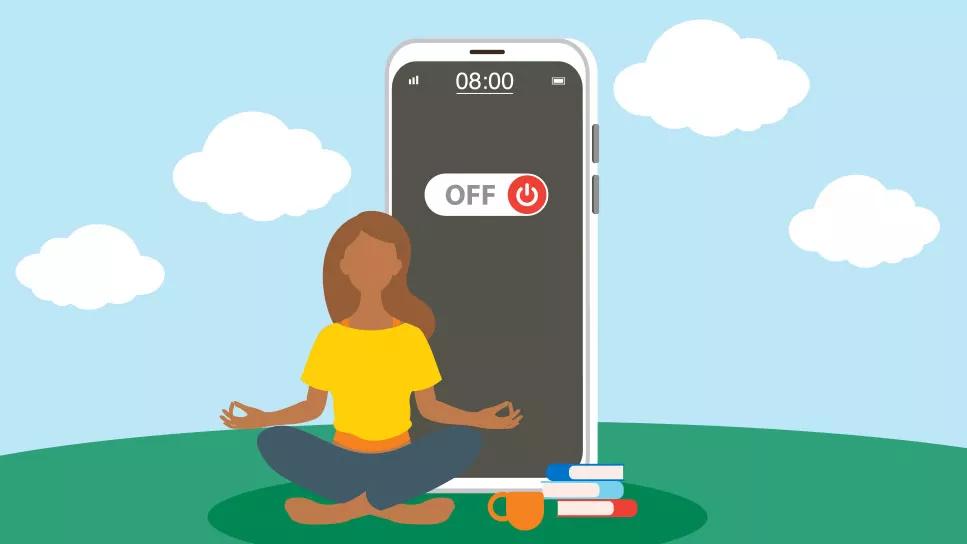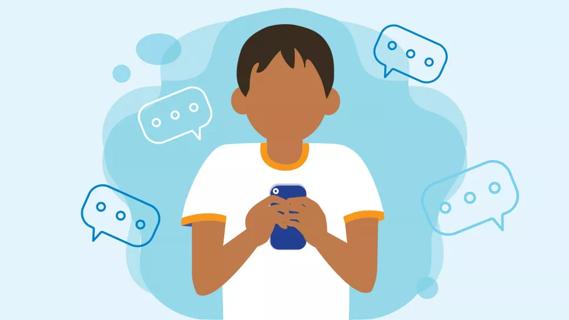Identify your triggers, set ground rules for your break and start practicing mindfulness

One minute you’re happy and content, thinking life is going pretty well. You have a few minutes to spare, so you open Instagram and start scrolling…
Advertisement
Cleveland Clinic is a non-profit academic medical center. Advertising on our site helps support our mission. We do not endorse non-Cleveland Clinic products or services. Policy
First, you spot a friend’s post about landing her dream job. Then, a ranting meme from a neighbor. Oh, and a video of that guy from college on an amazing tropical vacation.
The next thing you know, you’re second-guessing your career, feeling riled up about politics and lamenting all the vacations you can’t take.
If your time on social media has become an emotional roller coaster of comparison, perfectionism and unwelcome opinions, it might be time to take a break. But how do you get off the ride?
Psychologist Adam Borland, PsyD, discusses signs it might be time to step back and how you can make it stick.
If you often find yourself thinking, Whoa, where did the time go?! or can’t remember why you first opened the app to begin with, you’re probably spending too much time online. But if you’re looking for a definitive number of minutes to spend on social media, you won’t find it here.
“It’s not necessarily about the amount of time you’re spending on social media, but rather the negative effect it may be having on you,” Dr. Borland clarifies.
Here are some tips to clue you in to the fact that it may be time to take a break.
Advertisement
Too much time spent on social media can bring FOMO, but taking a break can bring JOMO, or the joy of missing out. Here’s what you may be able to gain from time off:
You’ve decided it’s time for a social media detox … now what? The goal, Dr. Borland says, should be to learn to approach your time online with awareness and intention. This is called mindfulness, and it’s all about staying focused on the present moment.
“It’s the idea of trying to be as emotionally present as possible,” he explains, “and getting in the practice of saying to yourself, I'm going into this with intent.”
These tips will help you go offline — and return (if you want) with more thoughtfulness and restraint.
The ancient philosopher Socrates said the best way to achieve true wisdom is to “know thyself.” Though he couldn’t have envisioned today’s tech, Socrates’ advice is still sage.
“Try to recognize when you’re most vulnerable or susceptible to using social media,” Dr. Borland advises. “Maybe you spend your entire lunch break on TikTok, or you start doomscrolling before bed.”
Pay attention to your emotional responses as you use social media, too. Do you feel tense, angry, annoyed? When do those reactions occur? Are they inspired by certain types of content or actions?
Maybe you’re checking how many “likes” your photos get or delving too deep into the comments section. Maybe you feel less-than when you watch beauty-related content, or when you check in on your high school frenemy with the super-impressive job.
Advertisement
Whatever the case, start making mental (or even physical) notes about your social media use. To start, you don’t have to do anything; just observe your habits and keep track of them. Get to know thyself, as old Socrates would say.
There are no set rules for taking time off social media. You get to define how long your break is and what it includes. But Dr. Borland says a good starting point is trying to respond to your triggers and habits.
Let’s go back to the TikTok-at-lunch example. You could start imposing a specific time limit, like you can check the app for the last 15 minutes of your lunch break — right before you go back to work, so you don’t have time to endlessly scroll.
There are other options, too, depending on what you feel like you need. Maybe you’re trying to scale back for the long haul or maybe you’re just looking for a time-limited detox to help you reset a little. You might want to:
“Experiment with what works best for you,” Dr. Borland recommends. You’re in charge.
When you take a break, you can announce it online first (like if you think people might worry about your absence) or simply step away. Whatever you decide, you might find it helpful to share your plan with a loved one.
Advertisement
“A big part of that is, first of all, admitting it to yourself,” Dr. Borland says. “Then, by admitting it to a friend, it becomes that much more real. You’re owning up to the fact that you’re spending too much time online.”
Some people even have a trusted friend change their social media passwords so they can’t get back online mid-break. But Dr. Borland says that in the end, you have to be willing to change your habits yourself: “Ultimately, it has to be on you.”
If you choose not to delete the apps but want some extra help reducing your social media use, you can bring in backup:
That’s right: You can use technology to help you impose limits on technology. “These tools can help you prove to yourself that you can begin to scale back,” Dr. Borland states.
Being aware of your bodily feelings and sensations is a major aspect of mindfulness. During your break, try to notice the way you feel, both emotionally and physically. Are you jittery, anxious, amped-up? Maybe you’re fidgeting or bouncing your knee or tensing your shoulders up near your ears.
Advertisement
“Take a moment and pause,” Dr. Borland advises. “Check in with yourself and say, I’m having a reaction. What is my body telling me? What is going on right now?”
When you pause to consider it, you may realize that you’re itching to check TikTok. Or post a photo to Instagram. Or engage in a debate on X. Or whatever other aspect of social media it is that you so desperately crave.
“It all comes down to mindfulness training,” Dr. Borland emphasizes. “Don’t be hard on yourself for it, but accept the fact that that’s what’s going on right now.”
You’ve noticed yourself feeling amped-up sans social media … but what can you do about it? Breathwork techniques can help calm you down and move your body into a more relaxed, stress-free state.
“The great thing about deep breathing is that it forces us to focus on that one inhale and that one exhale,” Dr. Borland says. “It helps us stop and reset.”
He also suggests changing your environment, however briefly, so you’re not sitting around feeling antsy about the apps. Step outside and breathe fresh air. Listen to your favorite song. Pet your cat. Just find some small way to distract and re-ground yourself.
Now that you have all this time back … what will you do with it?
“It’s important to have something to replace the time you usually spend on social media,” Dr. Borland advises, “and it may require a little bit of brainstorming to figure out what that will be.”
It’s time to explore some hobbies! Read a book, become a home chef, try something you loved as a kid that you’d forgotten all about. Make plans to catch up with friends you haven’t seen in a while (and leave your phone in your pocket).
Figure out something else you can turn to when you’re hit with the urge to scroll — and practice living life without needing to turn it into content.
You’re back online, and now you’re trying to figure out how to uphold and honor the lessons you learned from your break. But how? Dr. Borland shares a few final tips for turning that feeling of disconnectedness into a lasting habit.
To keep social media use to a minimum, you’ll have to make changes to your routines. Go back to those initial habits and triggers: What shifts can you make in your daily life?
“You want to figure out how to create a new routine that will help you break certain unhealthy habits,” Dr. Borland says. Consider:
Have you heard the term “hate follow”? It’s when you follow accounts that make you feel bad, whether that’s angry, judgmental, annoyed or jealous. Sometimes, it’s on purpose — but sometimes, you don’t realize you’re doing it.
Take inventory of the accounts you follow and weed out anything that doesn’t sit right with you. If a certain account or type of content makes you feel bad about yourself or otherwise raises your hackles, don’t hesitate to unfollow or mute.
“If someone makes your blood pressure rise or always makes you roll your eyes, ask yourself: What’s the point of following them? Why am I here?” Dr. Borland says. “You want to surround yourself with positive people and accounts.”
That doesn’t mean turning to toxic positivity. It just means surrounding yourself, via your social media feeds, with accounts that make you feel good and excited about life — accounts that add something positive, not annoyance and stress.
To maintain your newfound perspective on social media and the role it plays in your life, continually ask yourself how you want to use up your energy — yep, just like you’re a video game character with limited lives.
“Each of us has a certain amount of energy for each day, and if we waste it on certain things that don’t matter as much to us, then we have less of it to devote to the important things in our lives,” Dr. Borland explains.
Next time you find yourself hunched over your phone or poised to engage in battle in the comment section, ask yourself: Is this what matters to me? What else could I be doing with my limited and precious energy? And then step away accordingly.
Think about your efforts to spend less time on social media as you would think about a new workout regimen or adopting healthier eating habits: You can’t expect to be perfect at it right away, especially because social media can become addictive.
“In any situation like that, it’s about small steps,” Dr. Borland reassures. “It’s about celebrating small wins, which add up and give you the motivation to continue.”
One study found that it takes about three weeks to start noticing the advantages of limited social media time. Give it time, and expect some bumps in the road and backsliding now and then. But don’t let them deter you from your goals. You’ve got this!

Sign up for our Health Essentials emails for expert guidance on nutrition, fitness, sleep, skin care and more.
Learn more about our editorial process.
Advertisement

It isn’t a recognized mental health disorder, but research shows that problematic social media use can negatively affect your mental health, self-esteem and sleep

Too much blue light, especially from digital sources, may lead to eye strain and computer vision syndrome

When done in excess, watching TV can disrupt your sleep and lead to physical inactivity and social isolation

Imagination, completing tasks and social interactions are all key benefits for your brain

They’re fun to watch, but medical TV shows are often more hype than reality — and you shouldn’t rely on them for factual medical information

Embrace mindfulness and practice checking your phone consciously, not compulsively

Too much screen time and unrealistic expectations and perceptions and can lead to an increased risk of anxiety and depression

It can affect your child’s development, but not in a way you might think

Even small moments of time outdoors can help reduce stress, boost mood and restore a sense of calm

A correct prescription helps your eyes see clearly — but as natural changes occur, you may need stronger or different eyeglasses

Both are medical emergencies, but they are very distinct events with different causes